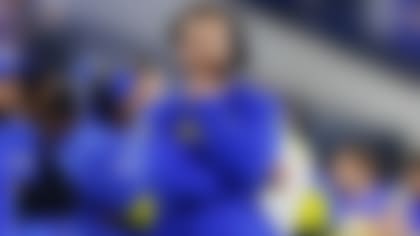With COVID-19 infection rates rising rapidly throughout the country, the NFL announced that starting on Saturday all 32 teams will operate for the rest of the season under the league's intensive protocol.
That calls for, among other restrictions, all players and coaches must have a negative from the previous day's testing before entering the facility, in addition to regular daily PCR testing, all meetings being held virtually unless they can be held outdoors or indoors with a pre-approved plan, and for face masks being worn at all times at the facility, including on the practice field by all personnel. All meals must be served in grab and go style to prevent people from congregating in meal rooms. Locker room use is strongly discouraged on non-game days.
The protocol also prohibits team or player gatherings away from the facility, a particularly important prohibition with Thanksgiving next week.
"The upcoming holidays, beginning with Thanksgiving next week, will introduce new risks of exposure that we need to address now," Commissioner Roger Goodell wrote in a memo to teams Wednesday, obtained by NFL Media. "Because we have a highly sophisticated program of daily testing, we know when the virus enters our facilities, which underscores the importance of contact tracing and other steps to minimize close contacts within a facility. Recent experience has highlighted the importance of minimizing high-risk close contacts; on multiple occasions, we have seen individuals identified on that basis test positive within a short time. We have also seen many instances in which effective action by clubs to minimize these close contacts prevented the virus from spreading within the club, and avoided players or coaches being ruled out of practice or games."
Until now, the intensive protocol, which was introduced on Oct. 1, was reserved for teams that had positive tests or had been exposed to a team with positive tests. Twenty-eight teams have been in the intensive protocol at some point this season and many have voluntarily adapted some of the restrictions. Since the intensive protocol was put in place and a subsequent mandate calling for a five-day isolation period for identified as "high-risk close contacts" of a player or coach who tested positive, the NFL has been able to eliminate widespread outbreaks like the one suffered earlier this season by the Tennessee Titans, which caused a significant disruption to the schedule. The NFL has played all games on schedule for the last five weeks.

According to the NFL, clubs that were in the intensive protocol had more than a 50 percent reduction in overall close contacts with other people at the facility, compared to teams that were not in the intensive protocols. That mitigates the risk of virus spread, even if individuals at the team test positive. The NFL also said there have been more than 20 cases of positives tests while teams are in intensive protocols that did not have any high risk close contacts. That, the league said, indicates that the intensive protocol is effective at getting teams to space out in all parts of the facility -- there are limits on the number of people who can be in the weight room at one time, for instance -- a key component in limiting outbreaks. No club that has been in the intensive protocol since it was introduced in early October has seen the spread of the virus.
But the NFL is unquestionably impacted by the skyrocketing case numbers around the country. Earlier this week, Dr. Allen Sills, the NFL's chief medical officer, said that genome testing performed on every positive case, has indicated that the virus has not been spreading within teams since the intensive and high-risk close contact protocols were put in place. Rather, the increase in the number of positive cases on teams in recent weeks is coming from community spread outside of the team -- players and coaches are catching the virus from someone they interact with outside of the team, a reflection of the difficulties of playing without a bubble during the country's failure to contain the virus. Goodell's memo also said it is likely that further changes to the protocol will likely be necessary as the season continues.




